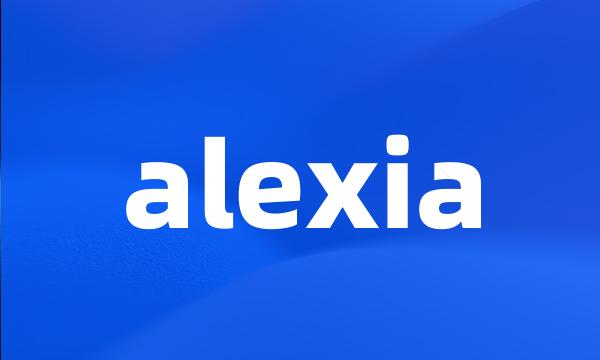alexia
- n.失读症;读字不能
 alexia
alexia-
Evaluation and primary analysis of a pure Chinese alexia case
汉语纯失读症患者的评价与初步分析
-
Preliminary study on the mechanism of reading recovery in a pure alexia by using functional MRI
纯失读症患者阅读功能恢复机制的功能MRI初步研究
-
There are different classes of alexia between Chinese and western languages .
汉字失读的类型与西方语言不同。
-
Alexia said : ' I love learning languages .
Alexia说:我喜欢学习语言。
-
Objective : To analyze the linguistic , cognitive and imaging features of a pure alexia case .
目的:从语言、认知、影像学角度对1例纯失读症患者进行分析。
-
Deep alexia occurred only at late stage of AD.
深层失读仅出现在AD晚期。
-
Correlation between pure alexia and occipital impairment in cerebral hemisphere
纯失读症与大脑半球枕叶病变的关系
-
The healthy food trend also presents new business opportunities , says Alexia Howard , an analyst at Bernstein .
伯恩斯坦(Bernstein)分析师亚历克西娅霍华德(AlexiaHoward)表示,健康食品风潮也带来了新商机。
-
Understanding the basic mechanism of reading is the foundation for studying the pathogenesis of alexia and its rehabilitation care .
对阅读基本机制的了解是研究失读症发病机制和对失读症进行康复治疗的基础。
-
Shell Alexia 50 Oil is Shell ′ s main cylinder oil for low ( slow ) speed crosshead engines .
壳牌Alexia50润滑油是壳牌公司为低(慢)速十字柴油发动机研制的主要气缸润滑油。
-
Deep alexia of the patients with transcortical sensory aphasia
经皮质感觉性失语患者的深部失读
-
A patient with pure alexia after left occipitoparietal infarction was studied with aphasis examination .
报道一例左顶枕梗塞后纯失读病人。
-
Alexia has been tri-lingual since birth as her mum is half French and half Spanish and her dad Richard is English .
自打出生起,阿莱克西亚就会三门语言,因为她妈妈是法国和西班牙混血,爸爸理查德是英国人。
-
The royal couple have three daughters , Amalia , nine , Alexia , seven , and Ariane , five .
这对皇室夫妻育有三个女儿,9岁的阿玛莉亚、7岁的亚历克西娅和5岁的艾丽安。
-
Last week Alexia went to Brussels , Belgium , to translate a top European Union meeting after winning the'most courageous child'award at a local community event .
上周,AlexiaSloane在获得“最勇敢的孩子”称号后,她前往比利时布鲁塞尔,担任欧盟会议的翻译。
-
These reading findings provide unequivocal evidence for the existence of implicit reading in Chinese readers with pure alexia and further suggest the involvement of the right hemisphere .
阅读检查结果表明汉语汉语纯失读患者中存在更强的隐性阅读,为右脑在阅读中的作用提供了进一步的证据。
-
Damaged in right cortex : quaque 1 patients with Pure Words Mutitas and Pure Alexia , all 2 patients with Aphasia Agraphia ;
右侧皮层损害全部是语言性失写2例;
-
Methods Six patients with transcortical sensory aphasia and deep alexia were examined by supplemental reading tests i.e. reading aloud 92 words first and then matching picture or interpreting .
方法对6例经皮质感觉性失语并深部失读患者做补充阅读检查&92个词先朗读,后配画或解释。
-
Alexia with her mother Isabelle.At10-years-old she has become the youngest interpreter to work at the European Parliament and she is blind translater .
据悉,她是欧洲议会有史以来,最年轻的一名盲人翻译。
-
Alexia lives with her parents Isabelle , 43 , and Richard , 61 , both teachers in Cambridge and her four-year-old sister Melissa .
Alexia现在和父母以及一个四岁的妹妹住在一起,她的父母都是剑桥的老师。
-
The two met when alexia was horribly sick with non-Hodgkins lymphoma , when she was suffering through chemotherapy , when she was sad and wanted a friend .
他们认识时,雅莉克西亚正因「霍奇金症淋巴癌」重不适,当时她饱受化疗之苦,极度沮丧,需要一个朋友。
-
Results Among 3 patients with left occipital infarction , 2 patients showed alexia without agraphia . 1 patient showed alexia with agraphia . 3 cases showed the different peculiarities on the examination of reading abilities .
结果3例左枕叶梗死患者中,2例表现失读不伴失写,1例表现失读伴失写,阅读检查各自有其特点,并与病变的部位和范围密切相关;
-
Alexia has dreamed of becoming an interpreter since she was six and chose to go to the European Parliament as her prize when she won the Young Achiever Community Award of the Year .
从6岁起,成为一名口译员就一直是阿莱克西亚的梦想。在获得年度青年成就奖时,阿莱克西亚选择了去欧盟议会作为自己的奖励。
-
" There is usually a minimum age requirement of 14 just to enter the European Parliament so for Alexia to interpret there at the age of 10 was amazing ," said mum Isabelle .
阿莱克西亚的妈妈伊莎贝尔说:进入欧盟议会,一般都会有最低年龄14岁的限制,因而对于阿莱克西亚来说,10岁就为欧盟口译是非常了不起的。
-
Results The repetition errors of 13 patients with conduction aphasia showed dominantly phonological paraphasia ( 68.4 % ), but the errors of their reading aloud were dominantly semantic paraphasia ( 55.6 % and 57.8 % ) which belonged to the deep alexia .
结果虽13例传导性失语患者词复述错误主要是音位性错语(68.4%),但其朗读错误则以词义性错语(2项作业分别为55.6%和57.8%)为主,即属深部失读。
